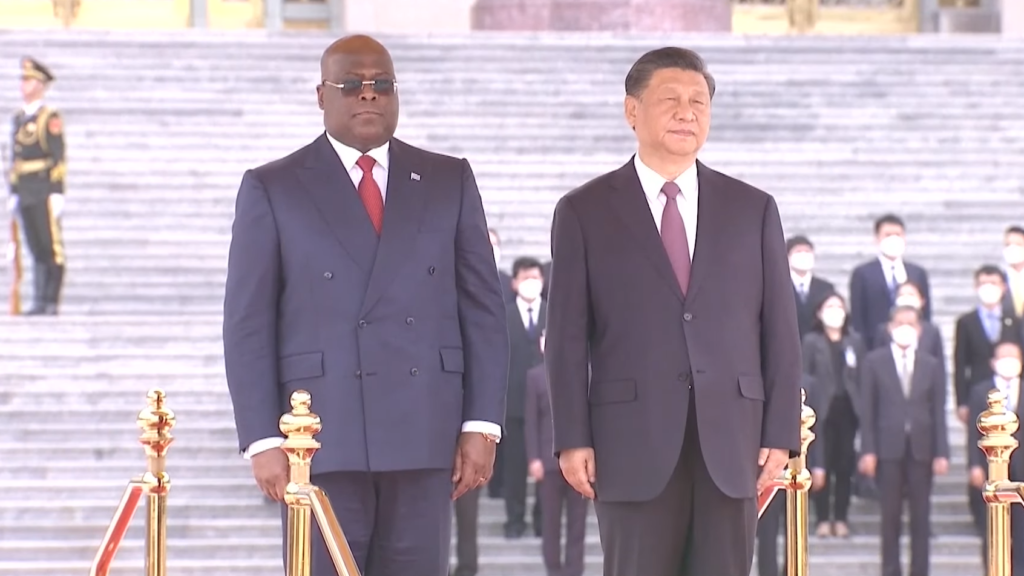
Chinese President Xi Jinping met his counterpart from the Democratic Republic of Congo, Felix Tshisekedi, on Friday in Beijing as the two countries seek to relaunch a partnership worth tens of billions of dollars in trade each year.
The governments agreed to conduct regular reviews of their cooperation in the mining industry and address related disputes through “friendly negotiations,” Chinese state broadcaster CCTV reported, citing a joint statement from the two nations.
They also announced their bilateral relationship will be upgraded to a comprehensive strategic cooperative partnership.
China is the main destination for most of Congo’s minerals, but Tshisekedi has become disgruntled by what he sees as his country’s meager take from the arrangement.
The Central African nation is the world’s largest producer of key battery ingredient cobalt and one of the richest sources of copper. Chinese companies including China Railway Group Co., CMOC Group Ltd. and Zijin Mining Group Co. are major players in the industry.
Tshisekedi is particularly unhappy with Congo’s $6.2 billion minerals-for-infrastructure deal agreed with China in 2008. According to the agreement, Chinese companies were supposed to build $3 billion worth of infrastructure funded by the proceeds of a $3.2 billion copper and cobalt venture known as Sicomines.
While the mine has been operating for years, less than a third of the development funds have been disbursed, according to Congo’s government. Congo is asking for billions in new and promised funds and for a more than doubling of its Sicomines stake, Reuters reported Wednesday.
China Railway and PowerChina Ltd., the two main Sicomines shareholders, didn’t respond to emails requesting comment.
Negotiations over a reworking of the deal are going “wonderfully” and should be completed by the end of the year, Erik Nyindu Kibambe, Tshisekedi’s director of communications, told reporters in Beijing on Friday.
Congo wants the deal to be state-to-state, not between Congo and companies, he said.
China said it would push its companies to speed up already agreed upon infrastructure projects and will encourage firms to invest in new energy battery value chain development initiatives in Congo, according to the joint statement.
The two countries will also expand their cooperation in agriculture, hydrocarbons, health, defense and security.
China said it supported regional peace talks to end conflict in eastern Congo, according to the statement. Congo accuses neighboring Rwanda of backing a rebel group that has contributed to a humanitarian catastrophe and has asked China to use its role at the United Nations to pressure the country, Nyindu Kibambe said.
Xi and other Chinese leaders — including Premier Li Qiang and Zhao Leji, chairman of the National People’s Congress — met Tshisekedi at a lavish event Friday in the Great Hall of the People in Beijing’s Tiananmen Square, complete with cannon salutes.
After meeting Xi, Tshisekedi is expected to travel with nine of his ministers to Shenzhen, Shanghai and Hong Kong.
The two countries signed six cooperation agreements during the meeting, Tshisekedi’s office said Friday in a text message. These include accords on ecological exploitation of natural resources, the development of a digital economy, information exchange, green growth promotion, and cooperation between each country’s national television networks, it said.
China and Congo will also sign an over-arching agreement in the coming months, the president’s office said Wednesday.
Congo is also finalizing negotiations with CMOC to increase royalty payments from its Tenke copper and cobalt mine joint venture with state-miner Gecamines. Gecamines officials are also on the trip.
Tshisekedi, who is up for re-election in December, will invite Xi to visit the Central African nation by the end of this year, Nyindu Kibambe said.
(With assistance from Jing Li)
Comments